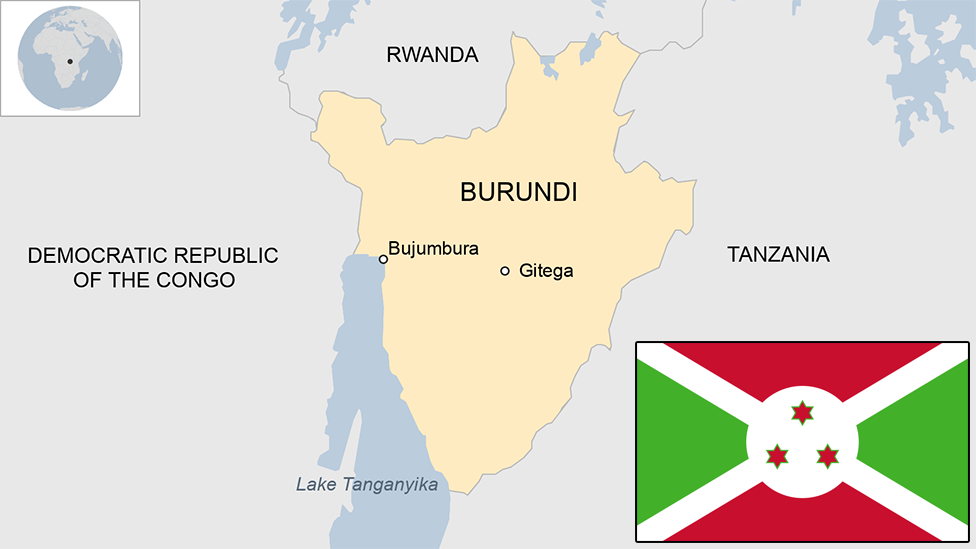Burundi coup bid: Three ringleaders arrested
- Published
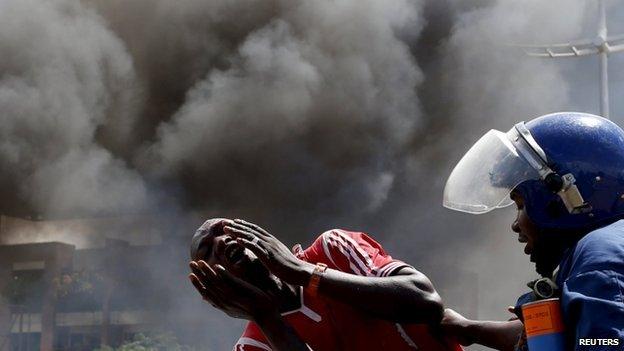
More than 100,000 people have fled since the unrest began last month
Three leaders of a failed coup against Burundi President Pierre Nkurunziza have been arrested, his spokesman says.
However, coup leader General Godefroid Niyombare is "still on the run". He told the AFP news agency that he and his followers were going to surrender, adding: "I hope they won't kill us."
The president has returned to the capital after being stuck in Tanzania.
More than 105,000 people have fled the country since the unrest began last month, the UN says, external.
Follow the latest live updates
Mr Nkurunziza, who was in Tanzania when the coup attempt against his bid to seek a third term was launched, is expected to make a national address on Friday.
He initially returned to his hometown of Ngozi, in the north, before travelling to the capital Bujumbura. He arrived in a huge convoy of vehicles and was met by cheering supporters dressed in party colours dancing and celebrating.
'Ask forgiveness'
Renegade general and former Defence Minister General Cyrille Ndayirukiye was one of the three coup leaders arrested on Friday, Mr Nkurunziza's spokesman, Gervais Abayeho, told the BBC World Service.
"If they are found to be among the coup leaders they will have to face justice," Mr Abayeho said, adding that only a small section of the army had rebelled. He denied that the army was divided.
Security Minister Gabriel Nizigama told the BBC that two police commissioners and about a dozen other police officers had also been arrested after a brief exchange of fire at one of the generals' houses where they were hiding.
Mr Nizigama denied reports that the detainees had been beaten during their arrest, saying they were detained under conditions befitting normal human rights.
Coup leaders and their aides should tell the nation that the coup had failed and ask the population for forgiveness for their actions, he added.
Meanwhile, there are reports of renewed protests in the capital against Mr Nkurunziza's decision to seek a third term in office.
Civil rights organisations had earlier urged people to go back to the streets, after weeks of protests.
Many view the president's bid as an unconstitutional move, with thousands celebrating in Bujumbura after Gen Niyombare announced the takeover on national radio on Wednesday.
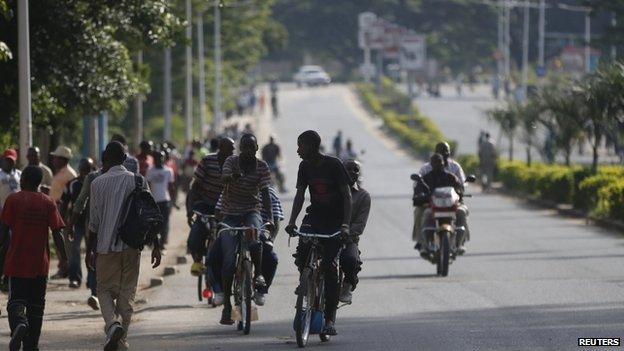
Burundi's capital Bujumbura was reportedly quieter on Friday
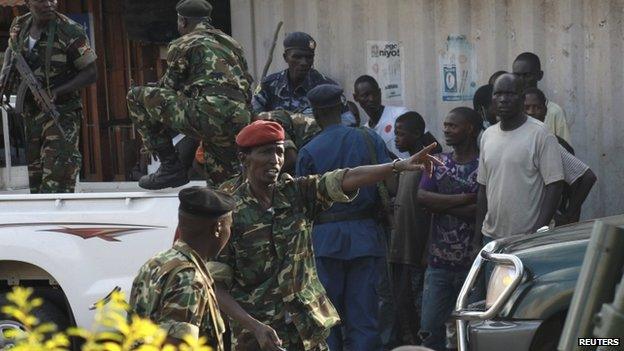
Ex-Defence Minister Gen Cyrille Ndayirukiye (C) was among the coup leaders arrested
Amid the insecurity, Friday saw the US urge its citizens to leave the country, and temporarily close its embassy.
At least five soldiers were killed in fighting for control of the national state TV and radio stations in Bujumbura on Thursday. Reuters puts the death toll higher at 12, quoting army chief of staff Gen Prime Niyongabo. The Burundi military says it now controls the building.
The UN refugee agency, UNHCR, released new figures on Friday on the number of refugees crossing into Burundi's neighbouring countries:
Tanzania: 70,187
Rwanda: 26,300
Democratic Republic of Congo: 9,183

How coup attempt unfolded
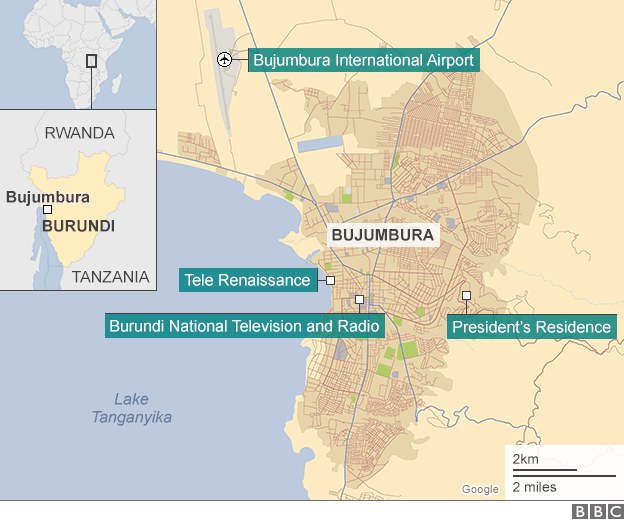
25 April: President Pierre Nkurunziza is nominated for a third term in office, a move his opponents say is unconstitutional
26 April: Protesters take to the streets of the capital Bujumbura, clashing with police over the decision, and more demonstrations follow in the coming days
6 May: President Nkurunziza praises the constitutional court's approval of his candidacy, and says his third term will be his last
9 May: Seven other hopefuls file their candidacies
13 May: With President Nkurunziza in neighbouring Tanzania discussing the crisis, General Godefroid Niyombare announces the dismissal of the president and his entire cabinet; thousands celebrate - but the coup attempt fails

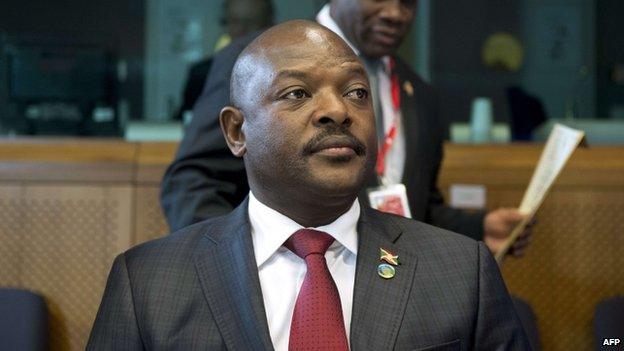
Mr Nkurunziza has ruled out delaying next month's elections
The unrest began after the 51-year-old president said he would run for re-election in June.
Opponents said this contravened the constitution, which states a president can only be elected to two terms.
Mr Nkurunziza argued he was entitled to a third term because he was first appointed to the role by parliament in 2005, rather than elected.
His spokesman says that elections will continue as planned.
Your 60-second guide to Burundi
- Published14 October 2015
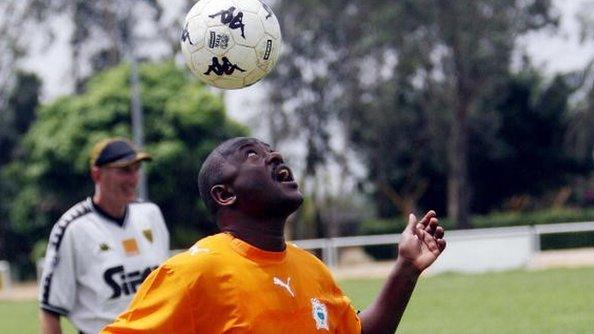
- Published15 May 2015
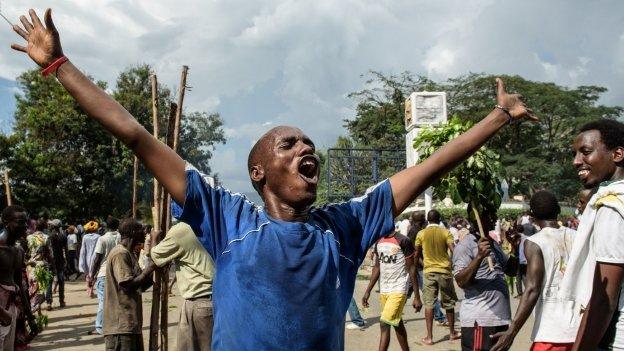
- Published31 July 2023
